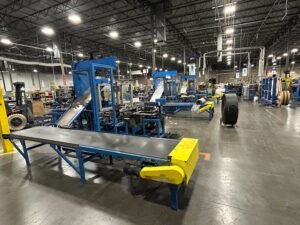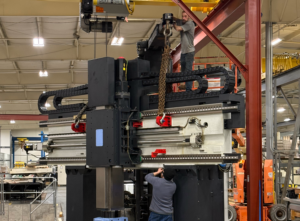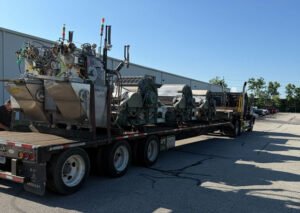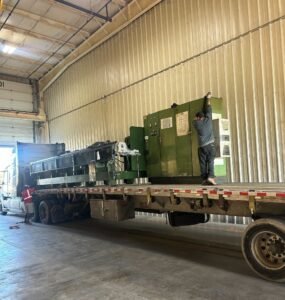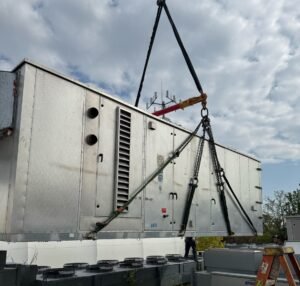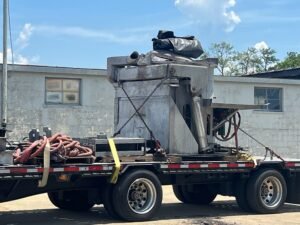In the ever-evolving landscape of logistics and supply chain management, the concept of lean warehousing has gained significant traction. Lean principles, originally derived from manufacturing, have found application in various industries, including warehousing. The core idea behind lean warehousing is to eliminate waste and optimize efficiency throughout the storage and distribution process. In this article, we will delve into the principles of lean warehousing and explore how industrial services play a crucial role in minimizing waste within warehouse operations.
Understanding Lean Warehousing
Lean warehousing is a systematic approach that focuses on the efficient use of resources, reduction of excess inventory, and elimination of non-value-added activities. It draws inspiration from the Toyota Production System and aims to create a streamlined, cost-effective, and agile warehouse environment. The key principles of lean warehousing include:
- Waste Elimination: Lean warehousing targets various forms of waste, known as “muda.” This can include excess inventory, unnecessary movements, waiting times, overproduction, and other inefficiencies. By identifying and eliminating these wasteful practices, warehouses can optimize their operations.
- Continuous Improvement: The concept of Kaizen, or continuous improvement, is integral to lean warehousing. It involves regularly assessing processes, identifying areas for improvement, and implementing incremental changes. Continuous improvement fosters a culture of efficiency and adaptability within the warehouse.
- Just-in-Time (JIT) Inventory: Lean warehousing promotes the adoption of just-in-time inventory management, wherein materials are ordered and received only as they are needed in the production process. This helps reduce excess inventory, holding costs, and the risk of obsolescence.
- Visual Management: Visual cues and indicators are used to enhance transparency and communication within the warehouse. This includes tools like Kanban boards, color-coded labels, and floor markings, making it easier for staff to understand and follow streamlined processes.
- Employee Empowerment: Engaging and empowering employees is crucial in lean warehousing. Workers at all levels are encouraged to contribute ideas for improvement, and their expertise is harnessed to enhance operational efficiency.
The Role of Industrial Services in Lean Warehousing
Industrial services play a pivotal role in the successful implementation of lean warehousing practices. These services encompass a wide range of solutions that enhance operational efficiency, improve safety, and contribute to overall waste reduction. Let’s explore the specific areas where industrial services make a significant impact:
Automated Material Handling Systems
Conveyor Systems
One of the primary sources of waste in traditional warehouses is the inefficient movement of materials. Conveyor systems are a key industrial service that addresses this issue by automating the movement of goods within the warehouse. These systems minimize the need for manual handling, reduce transportation time, and enhance overall efficiency.
Automated Guided Vehicles (AGVs)
AGVs are robotic vehicles that can transport materials within a warehouse without human intervention. They follow predefined paths or navigate using sensors, optimizing the flow of goods. AGVs contribute to waste reduction by eliminating the need for excessive manual transportation and reducing the risk of errors.
Warehouse Management Systems (WMS)
Real-time Inventory Tracking
Implementing a robust WMS is essential for lean warehousing. Real-time inventory tracking provided by WMS allows warehouses to maintain accurate stock levels, reducing the risk of overstocking or stockouts. This aligns with the just-in-time inventory principle of lean warehousing.
Order Picking Optimization
WMS can optimize the order picking process by providing intelligent algorithms for route planning and order consolidation. This minimizes the time and resources spent on order fulfillment, contributing to the elimination of waste in the picking process.
Data Analytics for Continuous Improvement
Industrial services related to data analytics offer valuable insights into warehouse operations. Analyzing data on order volumes, processing times, and other key metrics enables continuous improvement by identifying areas for optimization and waste reduction.
Lean Facility Design and Layout
Rack and Storage Systems
Efficient use of space is a fundamental aspect of lean warehousing. Industrial services related to rack and storage systems help maximize vertical space and improve accessibility. This ensures that inventory is stored in a way that minimizes unnecessary movements and reduces the risk of damage.
Modular and Flexible Infrastructure
Lean warehousing requires adaptability to changing demands. Industrial services that provide modular and flexible infrastructure solutions enable warehouses to reconfigure layouts quickly and efficiently, accommodating shifts in demand without creating bottlenecks or excess space.
Energy-Efficient Solutions
Sustainable and energy-efficient warehouse solutions contribute to waste reduction on multiple fronts. This includes the use of LED lighting, energy-efficient HVAC systems, and environmentally friendly building materials. By minimizing energy consumption, warehouses can reduce operational costs and environmental impact.
Employee Training and Safety Services
Training Programs on Lean Principles
To successfully implement lean warehousing, employees need to be well-versed in lean principles and practices. Industrial services that offer training programs on lean methodologies empower employees to actively participate in waste reduction initiatives.
Safety Consulting and Technology
Ensuring a safe working environment is crucial for both employee well-being and operational efficiency. Industrial services that provide safety consulting and technology, such as automated safety systems and ergonomic solutions, contribute to waste reduction by preventing accidents and injuries.
Workforce Management Solutions
Efficient utilization of the workforce is a key component of lean warehousing. Workforce management solutions, including software for scheduling, task allocation, and performance tracking, help optimize labor resources, reducing idle time and enhancing productivity.
Implementing Lean Warehousing: Challenges and Solutions
While the benefits of lean warehousing and industrial services are substantial, implementing these practices comes with its own set of challenges. Overcoming these challenges requires a combination of strategic planning, technology adoption, and a commitment to continuous improvement. Let’s explore some common challenges and effective solutions:
Resistance to Change
Resistance to change is a common hurdle in adopting lean warehousing practices. Change management strategies, including clear communication, employee involvement, and gradual implementation, can help overcome resistance. Creating a culture that values continuous improvement fosters a more receptive environment for change.
Technology Integration Complexity
Integrating advanced technologies such as automated material handling systems and warehouse management systems can be complex. A phased approach, coupled with comprehensive training programs, allows employees to adapt to new technologies gradually. This minimizes disruptions and ensures a smoother transition.
Initial Investment Costs
The initial investment in industrial services and technology may appear substantial, but conducting a thorough return on investment (ROI) analysis reveals the long-term benefits. The reduction in operational costs, improved efficiency, and waste elimination contribute to significant savings over time.
Sustainability Integration
Integrating sustainability into warehouse operations requires strategic partnerships with suppliers offering eco-friendly solutions. Additionally, adopting green initiatives, such as recycling programs and energy-efficient technologies, not only aligns with lean principles but also enhances the warehouse’s overall environmental responsibility.
Conclusion
In conclusion, lean warehousing is a transformative approach that goes beyond traditional inventory management. By embracing the
principles of waste elimination, continuous improvement, and employee empowerment, warehouses can optimize their operations for greater efficiency. Industrial services play a crucial role in this transformation by providing solutions that automate processes, enhance visibility, and contribute to a lean and agile warehouse environment.
As the logistics and supply chain industry continues to evolve, the integration of lean warehousing principles becomes increasingly vital. The combination of lean practices and industrial services not only minimizes waste but also positions warehouses to meet the challenges of a dynamic and competitive market. By investing in the right technologies, training programs, and infrastructure, warehouses can embark on a journey towards lean excellence, ultimately redefining the standards for efficiency and sustainability in the modern era of warehousing.









